Highlighting Australia
- As a proudly Australian initiative, we’re excited to showcase a collection of Australian stories, music, tributes and more.

Join activities, celebrations, study groups, spiritual empowerment and education programs for young people, and more.
Baha’i beliefs address essential spiritual themes for humanity’s collective and individual advancement. Learn more about these and more.

Featured in: Festival of Ridvan
Ridvan, also known as the Most Great Festival, celebrates Baha’u’llah’s time in the garden of Ridvan on the outskirts of Baghdad in 1863 when He publicly declared His station as a Manifestation of God. The Ridvan Festival is 12 days long and is also the time of year when Baha’is elect their governing bodies.
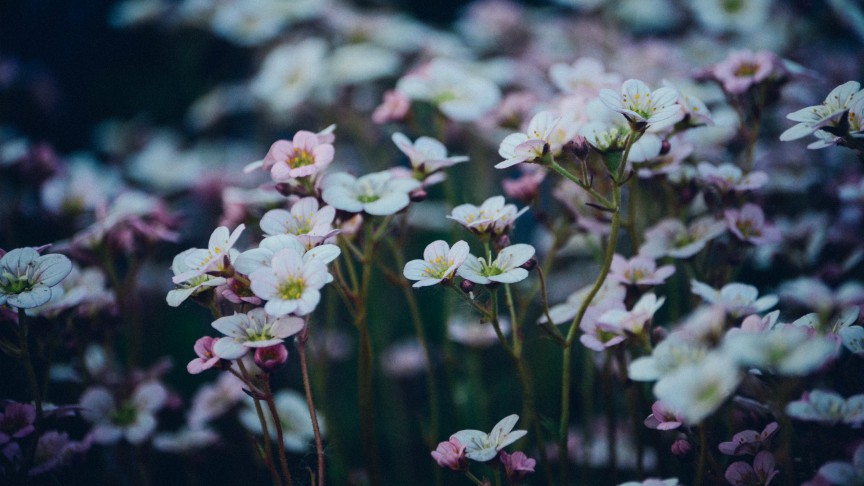
Ridvan is the King of Festivals in the Baha’i calendar. The twelve days of the Festival of Ridvan mark the momentous occasion when Baha’u’llah told His supporters that He was the Promised One they had been awaiting. At that time, Baha’u’llah was in a beautiful garden on the Tigris River in Baghdad. The garden was named Ridvan, or Paradise in English, by Baha’u’llah’s followers. Roses in full bloom lined its paths. Nightingales sang throughout the night. Baha’u’llah said:
The Divine Springtime is come, O Most Exalted Pen, for the Festival of the All-Merciful is fast approaching. Bestir thyself, and magnify, before the entire creation, the name of God, and celebrate His praise, in such wise that all created things may be regenerated and made new.1
Baha’is around the world reflect on the story of Ridvan each year. One year I realised that the Festival of Ridvan is the perfect time of year for big gardening projects. We live in Sydney, Australia so while the Northern Hemisphere is enjoying spring, we are in the midst of autumn. Each Ridvan I do things such as the mass planting of seeds, building new garden beds, pruning, etc. While I work in my garden, I reflect on the time Baha’u’llah spent in the Ridvan garden.
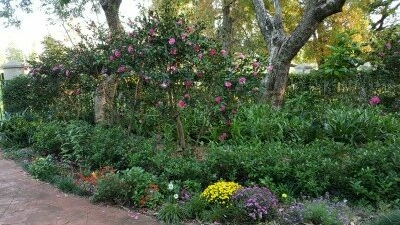
Gardening time is thinking time. As I have worked in the garden I have also been thinking about the Baha’i calendar. This calendar reflects the relationship between our planet and its sun. The calendar links our human life with the passage of time marked by plants and animals. I am filled with wonder at how in tune our calendar is with our natural environment. The start of the Baha’i year, Naw-Ruz, is celebrated when the vernal equinox begins in the Northern Hemisphere using Tihran, Baha’u’llah’s birthplace, as its standard. On this day the sun sheds the same amount of light on every place on earth. Abdu’l-Baha said the following about Naw-Ruz:
When the sun appears at the equinox it causes a movement in all living things. The mineral world is set in motion, plants begin to sprout, the desert is changed into a prairie, trees bud and every living thing responds, including the bodies of animals and men.2
I don’t do any planting or pruning until Naw-Ruz. While the weather might be mild some times before this, we still could have some very hot days before then which could damage newly sown or pruned plants. I wait until Naw-Ruz in order to foster new growth in the garden.
Garden design is part of the work of a gardener. There are always dead plants and annuals that need replacing. When we moved into our house, the borders of the garden beds lining the paths were empty. I have been guided by Abdu’l-Baha’s words:
How unpleasing to the eye if all the flowers and plants, the leaves and blossoms, the fruits, the branches and the trees of that garden were all of the same shape and colour! Diversity of hues, form and shape, enricheth and adorneth the garden, and heighteneth the effect thereof. In like manner, when divers shades of thought, temperament and character, are brought together under the power and influence of one central agency, the beauty and glory of human perfection will be revealed and made manifest.3
The physical complements the spiritual and we can find guidance for both aspects of our lives in the Baha’i Writings. Just as the Baha’i gardens in Haifa and Akka demonstrate the principle of unity in diversity, we can also reflect this principle in our own gardens by planting a large variety of plants alongside each other.
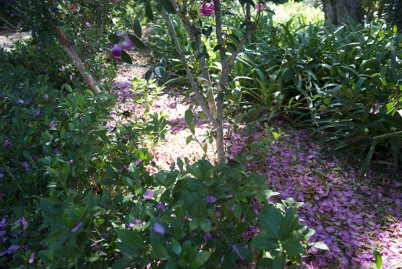
I worked on relieving the monotony of large patches of the same type of plant in our garden by filling the borders with a variety of flowering plants. Initially it can be more difficult working with diversity, but as Abdu’l-Baha says, the results are far greater. Having diversity in a garden also has practical benefits. If one plant is diseased, it can spread to all plants of the same type. In a garden with mono-plantings, this can kill all the plants and leave a large gap in the garden. A garden with diversity will be better able to withstand the disease in one plant. Another benefit is that plants flower at different times of the year. A garden with diversity will always have some plants flowering.
We share the garden with our next-door neighbours who are also our landlords. During Easter of last year, which occurred a week before Ridvan, they had a truckload of mulch, dirt, manure and stones delivered. They worked hard shovelling it from the place it was dumped and distributing it through the garden.
After their work the garden looked wonderful. The camellias were dropping pink petals on the lustrous green leaves of the gardenias and on a well-mulched garden path. The dahlias that marked the border of the garden beds were blooming, as were the dwarf chrysanthemums. The purple flower spears of salvia from another garden bed were spilling over the path. Days were going by with not a cloud and the sky was a beautiful autumnal blue. Our garden made hearts sing.
On the First Day of Ridvan I sat on our verandah with my morning cup of tea. And then the idea came. Our garden should be shared with others. As the idea grew I also reflected on the encouragement of the Universal House of Justice. Over successive messages it has encouraged Baha’is to foster interaction and harmony with their neighbours, to help our communities build bonds of friendship and co-operation with one another.
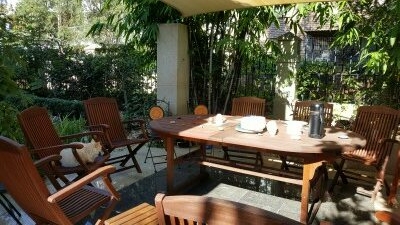
I decided to host an afternoon tea in the garden for our immediate neighbours to celebrate our garden and all the work that our neighbours had put into it. First, I asked our hard-working neighbours next door. They liked the idea. Then I knocked on the doors of the four flats joined onto our homes. Some of these neighbours I already knew but some were complete strangers to me. What would they think of the idea?
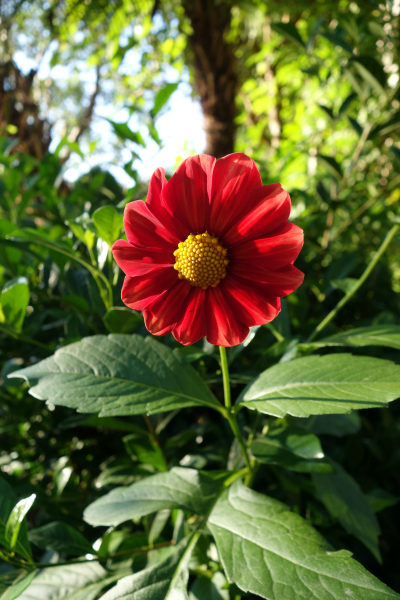
On the day I prepared lemon grass tea using the lemon grass growing in our garden. I labelled the potted cuttings of trimmed branches and stems that I had pruned at Naw-Ruz and knew would regrow and placed them behind the outdoor table. Inside I baked some scones and whipped the cream.
During the afternoon seven of our neighbours came. Gathered around our table were European Australians, Indian Australians and Persian Australians. I briefly shared the story of Ridvan and how it has inspired me with my work in the garden and to host the afternoon tea. We talked about gardening and learned more about each other. As the guests were leaving I invited them to choose a plant and cut some herbs from our garden for them to take home.
The weather was glorious and the companionship warm. The weather, the garden and most importantly the people, reflected the spirit of Ridvan. The Divine Springtime has indeed come!
"*" indicates required fields
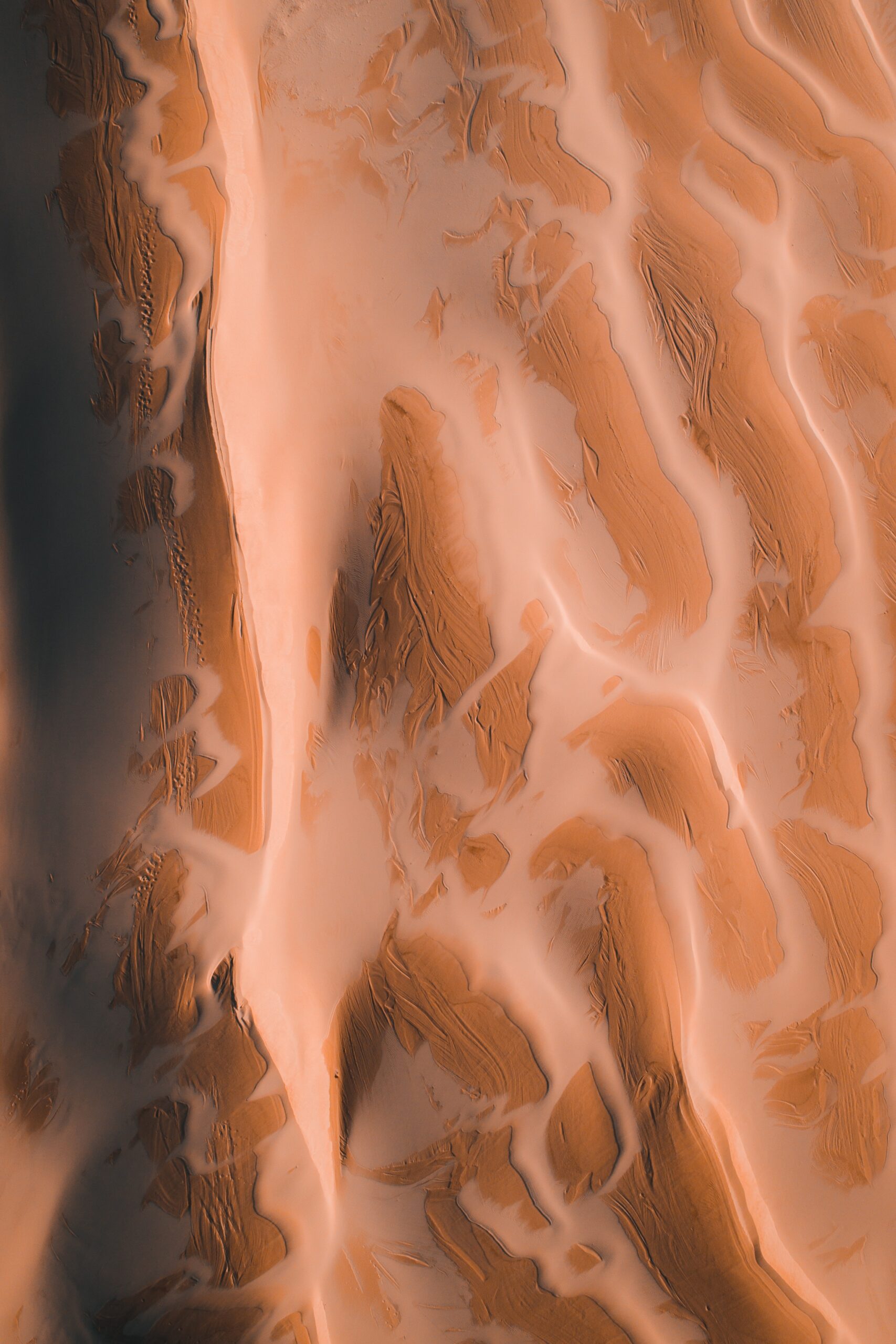
We recognise their continuing connection to land, waters and community. We pay our respects to Aboriginal and Torres Strait Islander people and their cultures; and to elders both past and present.
The views expressed in our content reflect individual perspectives and do not represent authoritative views of the Baha’i Faith.

Visit the site of the
Australian Baha’i Community
and the Baha’i Faith Worldwide
Notifications
I love this idea!
Lynette Thomas (April 4, 2018 at 4:29 AM)
Thank you! And it is fantastic that we have the Baha’i Blog where we can exchange ideas. I have learned so much from the posts here.
Yvonne Perkins (April 4, 2018 at 8:52 AM)
Thanks so much for your feedback and encouragement Yvonne! Glad you like it!
Naysan Naraqi (April 4, 2018 at 1:58 AM)
Such an inspiration!! Thank you Yvonne
Wendy Jewell (April 4, 2018 at 7:03 AM)
Wonderful story – I would love to visit your garden of Ridvan!
Mary Wilson (April 4, 2023 at 9:25 PM)